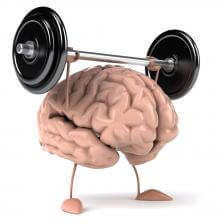How to Trick Your Brain into Giving Your Body a Better Workout (Part 2)
In Part 2 of this series, Get-Fit Guy has 6 tips to ensure that your brain is healthy. Plus – find out what are the best brain-boosting foods!
Ben Greenfield
Listen
How to Trick Your Brain into Giving Your Body a Better Workout (Part 2)

Tip #1: Moderate Stimulants
Low dose caffeine can improve mental performance and protect against Alzheimer’s, so you don’t need to avoid it entirely. But acting in a similar manner to anti-depressants, high doses of caffeine, ephedrine, ephedra, guarana, Ritalin, and any other central nervous system stimulants can flood the brain with too much stimulation, and actually cause you to become desensitized to neurotransmitters – the tiny molecules that your brain and nervous system use to communicate.

There’s a reason that I personally drink no more than 8-10 ounces of black coffee each day, and switch to decaf for at least 1 week every couple of months. People who frequently drink coffee, tea, soda, or energy drinks actually change their brain’s chemistry and physical characteristics over time. Because it is both water and fat soluble, caffeine can easily cross your blood-brain barrier, and as you dump more and more caffeine into your body, you build up a chemical tolerance. Here’s a link to an interesting New York Times article about how that happens.
The good news is that to kick a caffeine habit, you only need to get through about 7-12 days of caffeine avoidance, which is why I recommend taking week-long breaks from coffee and other similar stimulants every couple of months to make sure you don’t build a dependence.
Tip #2: Avoid Toxin Exposure
Whether it’s mycotoxins from moldy coffee, the fragrance of your cologne or perfume wafting into your nasal chambers, or the air freshener hanging your car, toxins affect production of neurotransmitters and also our sensitivity to neurotransmitters, causing brain fog.
Here are a few ways to reduce your toxin exposure:
- Use organic fruits and vegetables whenever possible (and if not, wash produce in a water and vinegar solution)
- Use natural cleaning chemicals (lemon juice, vinegar, baking soda)
- Use natural personal care products (avoid parabens, dyes, fragrances)
- Use home air and water filters
- Use holistic dentistry
If you want more details, read my article How to Protect Your Body From the 10 Hidden Killers in Your Home.
Tip #3: Avoid Sensory Overload

Your brain must calm itself down from all this stimuli using it’s own precious supply of calming, inhibitory neurotransmitters. This overstimulation has a significant impact on neurotransmitters and neurotransmitter receptors. So consider the following:
- Do you listen to loud music while you’re exercising?
- Do you have a steady diet of fast-moving, exciting or violent movies or video games, especially before bed?
- Do you play lots of computer games, often for long periods of time, such as several hours?
- Do you spend much of your day staring at a computer monitor?
- Do you constantly have the radio or streaming music playing in the background?
- Does your home or workplace constantly have artificial, fluorescent lighting turned on?
If so, then try to cut down on some of these stimulants. Instead, include more silence, quiet, and rest. Do not be afraid to unplug and take time to breathe.
Tip #4: Fix Your Gut
The nervous system in your gut uses more than 30 neurotransmitters, just like the brain. In fact, 95% of the body’s serotonin is in the gut. This makes sense when you consider that in the 9 meters of your digestive system “tube,” there are about 100 million neurons, more than in either your spinal cord or your entire peripheral nervous system!
If your gut lining is damaged or your gut flora is out of balance, then you are at serious risk for neurotransmitter deficiencies and imbalances.
This also explains why Irritable Bowel Syndrome, something that afflicts nearly every active individual now and then, arises in part from too much serotonin in your gut – a neurotransmitter imbalance.
Not only does your gut lining produce neurotransmitters, but the billions of bacteria living in your gut also churn out neurotransmitters. So if your gut lining is damaged or your gut flora is out of balance, then you are at serious risk for neurotransmitter deficiencies and imbalances.
Check out my article How to Fix Your Gut for the steps you can take to fix these gut-brain issues and get healthy!
Tip #5: Replace Building Blocks
Neurotransmitters are primarily comprised of amino acids, vitamin B, and minerals. A deficiency of any of these crucial compounds can leave you with inadequate neurotransmitter building blocks.
Some of the best high quality amino acid sources include grass-fed beef, wild salmon, eggs from pastured chickens, raw organic dairy, almond and almond butter, quinoa, and spirulina or chlorella sources.
In order for the nervous system to synthesize and circulate the neurotransmitters formed by amino acid precursors, you need to have adequate intake of B complex vitamins, and Vitamins B6, B12, and folate are especially important in nerve metabolism. Excellent food sources of vitamin B6 include bell peppers, turnip greens, and spinach; excellent sources of folate include spinach, parsley, broccoli, beets, turnip and mustard greens, asparagus, romaine lettuce, calf’s liver, and lentils, and excellent sources of B12 include calf’s liver and snapper.
Check out Nutrition Diva’s video on how to make salmon in parchment
Finally, you’ll get very good doses of minerals from a well-balanced diet that includes a broad spectrum of the real foods and nutrient-dense sources. Minerals are especially important if you’re frequently sweating or under high amounts of exercise or lifestyle stress.
Tip #6: Eat Healthy Fats
One of the ways to enhance the speed with which your brain communicates with your body and muscles is to care for the health of your nerves. Your nerves are wrapped in sheaths called myelin sheaths, and a diet for a healthy nervous system should be comprised of specific nutrients that support the formation of these myelin sheaths, and also the health of the nervous system as a whole.
After all, it doesn’t matter how healthy your brain is if it can’t communicate with your body because you have broken down, degraded myelin sheaths.

So let’s do a quick review: moderate your stimulant intake, avoid toxin exposure, avoid sensory overload, fix your gut, eat brain building blocks, and eat the right kind of fats. If you can do these 6 things, then you’re going to find your brain is well prepared to allow your body to get a better workout!
In the meantime, if you have more questions about how to get a healthy brain or how to trick your brain into giving your body a better workout, leave them at Facebook.com/GetFitGuy!

